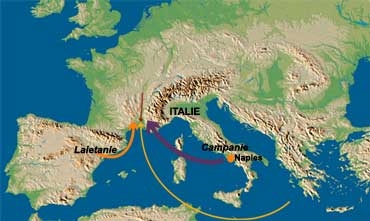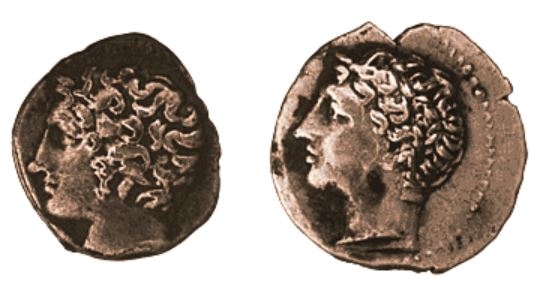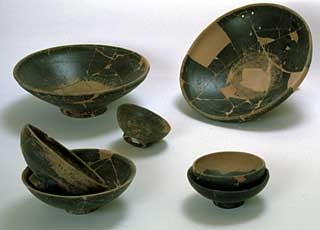- Home
- Artisans and farmers
- Trade
Map of trade routes in the western Mediterranean
Marseilles: an obligatory point of passage
Very early on, the populations of Provence received objects originating from long distances (Sardinian obsidian as early as the Neolithic, for example). However, we do not know if this was the result of direct contacts with the regions of production, or if these products arrived through successive exchanges. On this matter, we are equally ignorant concerning the Entremont period. Based on the nearly exclusive presence at the site of monies from Marseilles, we could suppose that the great majority of trade passed through this city. However, we also know that direct contacts (mercenaries, ambassadors) were established with other Mediterranean peoples, which also could have led to commercial relations.
Two silver drachmas from Marseilles found at Entremont
Relations with other Gallic peoples
Relations with inland Gallic peoples are more easily admitted, but they are attested on the site by only a few Gallic coins and ceramic fragments from the Rhone Valley.
Exchanges with the Mediterranean world
Based on archaeological remains, the commerce of Entremont appears to be nearly exclusively Mediterranean: glass from Egypt, dishes from Campania, northern Italy, Greece and Catalonia, wine amphorae from Greece, the Punic world and, of course, southern Italy. Products from Marseilles are also abundant (modeled ceramics from Etoile, light colored ceramics, mortars). One very significant object from Marseilles provides evidence of cultural and technical influence, as well as proof of commercial relations; this is a counterweight of a winch press made from stone from Couronne, which is the location of the quarries exploited by the Marseillans for all of their Hellenistic monuments. The presence of coral is perhaps indicative of nothing more than the internal trade of the Salyens, whose territory was largely coastal.
We can easily imagine the goods that the Entremont inhabitants could have traded for these imports: raw agricultural products (cereals, fruits, animals, meat, wool), transformed products (oil, for example), and perhaps slaves, which the Mediterranean world often lacked.
Black varnished ceramics from Campania. CCJ.


